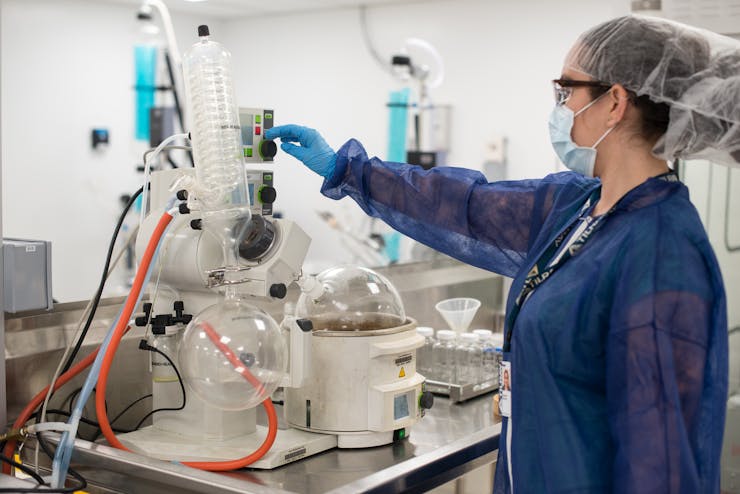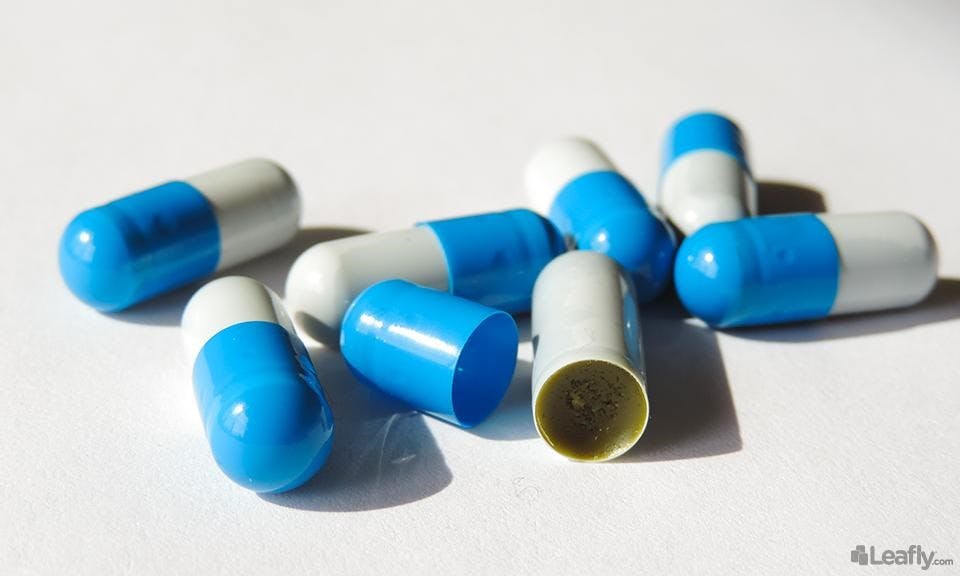This article is sponsored by Tilray, one of the largest and most sophisticated producers of medical cannabis in the world. Tilray is dedicated to providing safe, consistent, and reliable products to patients and furthering clinical research.
As research into the medical applications of cannabis compounds steadily increases, scientists and doctors are shedding new light on how cannabinoids interact with not only the human body, but with other cannabinoids. New studies are providing further insight on why these substances work, how they can be used most effectively, and what new applications they may have in the future.
We sat down with Nick Jikomes, Leafly’s in-house neuroscientist, to learn about what researchers are learning about the cannabinoid CBD, and how different doses can be put to use in treating a variety of conditions.

Nick Jikomes (Julia Sumpter/Leafly)
Tilray: Let’s start with the basics: what is CBD, exactly?
CBD, or cannabidiol, is one of the major cannabinoids found in Cannabis—typically the second most abundant after THC. It’s like THC in that it’s a plant cannabinoid with a similar chemical structure, but it’s also very different in terms of physiological effects.
The most obvious way that it’s different is that it’s non-intoxicating—CBD doesn’t get you high the way that THC does. There are also interactive effects between THC and CBD. They can enhance each other, but they can also get in the way of one another. Some of those interactions have potentially interesting medical applications.
What do we understand about that relationship between THC and CBD, and what are we learning about it?
The first thing to understand is how each one interacts with receptors in the nervous system. The major receptor in the endocannabinoid system (ECS) responsible for the psychoactive effects of cannabis is CB1, a receptor found predominantly in the nervous system. For classic psychoactive effects to be felt, THC needs to bind to that receptor and activate it.
CBD also interacts with the CB1 receptor, but in a different manner. It doesn’t activate that receptor; in fact, it makes it harder for the receptor to be activated by other compounds. CBD is essentially getting in the way of THC’s ability to bind the CB1 receptor, which is why the presence of CBD has a significant impact on the psychoactivity of THC-containing products. This is why the ratio of the two compounds is important for anticipating the effects of cannabis products.
The other thing to keep in mind is that most compounds, CBD included, interact with many different receptor systems. So, it’s not just the relationship with THC that’s interesting; CBD is interacting with many other receptors and having many different effects through those systems.

CBD is available in numerous forms, including liquid drops. (Courtesy of Tilray)
CBD is recommended for a wide range of symptoms and conditions—are there instances where you’d want some CBD with your THC, and others where you want just CBD?
Basically, yes. CBD may reduce many of the unwanted side effects of THC, such as short-term memory impairment and anxiety, which are more common at higher doses of THC. Often the more CBD you have relative to THC, the less of those things you should expect.
While THC and CBD have different pharmacological properties, they can both have similar physiological effects, probably acting through different mechanisms. For instance, both compounds can have analgesic and anti-inflammatory effects; they may act through different mechanisms, so having THC and CBD could potentially enhance an outcome surrounding pain relief.
Are we at the point in research where we can better understand, based on the condition a patient might have, what could be the most useful blend? Or is there still some trial and error involved for patients finding what is going to work best for them?
I don’t think the clinical evidence is currently at a point where you can say you want this particular ratio for this particular condition to a specific patient. If you are a patient who finds that a 1:1 THC to CBD blend is perfect for you, that’s great. But you’re most likely going to have to get there through some trial-and-error, and when you do, there are good reasons to think that blend won’t be perfect for you forever.
That’s because people’s physiologies change over time, including the ECS and how densely receptors are expressed in the brain and the body. These things change over the lifetime of an individual, and so the optimal ratios and doses of these compounds, whatever they may be, are probably going to change as well.

Medical cannabis providers carefully measure CBD for dosing. (Courtesy of Tilray)
It sounds like the proper dose, in the long run, can be kind of a moving target?
It can, and that’s one reason to be very cautious about being overly prescriptive about doses and ratios. There’s an interesting study on this topic looking at THC in mice, and the results suggest that the same dose of the same compound (THC, in this case) has very different behavioral and cellular effects depending on the age of the subjects.
This is a very common thing in the world of pharmaceuticals—different doses of a drug can have different effects. With substances that bind to a lot of different receptors, like CBD, there’s often a sweet spot around a mid-sized dose. That means you can’t necessarily expect the substance to be twice as strong if you double the dose—in fact, you might see the opposite.
And that article points out that there are also different conditions for which different dosages are effective?
Exactly. And that’s likely because CBD is binding to many different receptors throughout the body. At a fairly low dose, it will mainly hit the receptors it has the highest affinity for, or that are the most densely expressed. At higher doses, those receptors can become saturated, so the remainder of the CBD will interact with other receptor systems, and that’s where you may start to see different effects.
Are we starting to see a ceiling on effective dosages of CBD?
It depends on the condition you’re trying to treat. If you’re using CBD for anxiety, there may be that sweet spot, a middle dosage, that has the best effect, and it can become less effective if you increase the dose.
In epilepsy, that hasn’t been seen yet. They’re using very high doses in that treatment, and I don’t think anyone has yet observed a diminishment in effect as the dose goes up. But in most clinical studies looking at things like epilepsy, they’re using oral CBD (given in pill form) at very high doses – hundreds of milligrams per day. CBD has very low oral bioavailability, meaning that only a fraction of the CBD one would take in pill form ends up in the bloodstream and hitting the relevant receptors in the nervous system. So when thinking about dosage, it’s also important to consider the route of administration.
So the route of administration can impact how much CBD ends up in someone’s system?
That’s right. Again, CBD has very low oral bioavailability. So if you swallow CBD in pill form, only a fraction of that CBD will end up making it into the bloodstream and exert an effect in the brain or elsewhere in the body. Different routes of administration, such as vaporization, sublingual tinctures, or transdermal patches, provide a more direct route for CBD to enter the bloodstream. This probably allows for a larger proportion of the CBD in those products to enter the bloodstream. So, people interested in CBD products may want to consider experimenting with different routes of administration. A given amount of CBD in pill form could may not lead to the same outcomes as an identical amount taken via another route.








